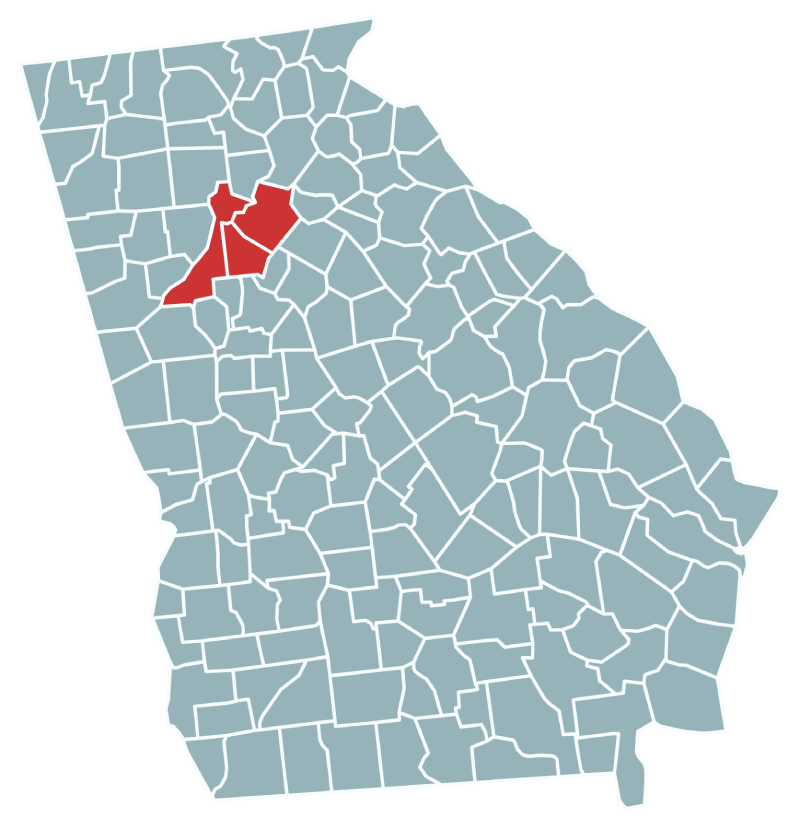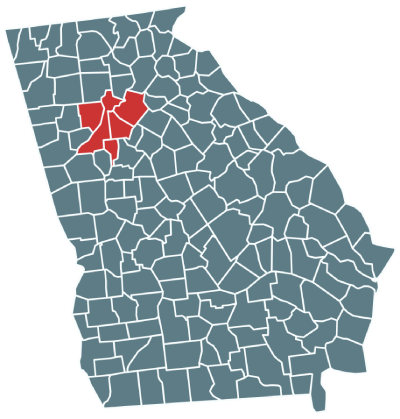Study Center: Georgia
The Division of Birth Defects and Infant Disorders in the Centers for Disease Control and Prevention (CDC) provides technical and administrative oversight to the Centers for Birth Defects Research and Prevention (CBDRP). CDC also coordinates the National Birth Defects Prevention Study (NBDPS) data management and analyses and serves as the Georgia study site. CDC brings a lot of experience, like studying medication use among pregnant women and finding new ways to look at the data. In addition, CDC keeps track of birth defects in Atlanta through the Metropolitan Atlanta Congenital Defects Program (MACDP). MACDP has collected data in Atlanta since 1968 and serves as a model for other state surveillance systems.
By participating in the NBDPS, more than 3,000 women from Georgia have helped us to understand the causes of birth defects. For more information on the Georgia study center, please visit the website.
Contact
Phone: 404-498-3946
E-mail: NBDPS@cdc.gov
Principal Investigators

Dr. Elizabeth Ailes
Scientific Lead
CDC Scientific Lead: Dr. Elizabeth Ailes is the Scientific Lead for the collaborative Centers for Birth Defects Research and Prevention (CBDRP) and the Principal Investigator (PI) of the Georgia Center. Dr. Ailes works with a team of computer programmers, communication specialists, and other scientists that coordinate the overall study logistics and combine the data from the individual Centers. In her role as the Georgia Center PI, she focuses on the collection of high-quality data from local study subjects. Dr. Ailes’ research focus is on infections and medication use and their relation to birth defects.
Mary Jenkins, PhD
Epidemiology Team Lead
CDC Birth Defects Monitoring and Research Branch, Epidemiology Team Lead: Mary Jenkins, PhD, is the Epidemiology Team Lead in the Birth Defects Monitoring and Prevention Branch, where the CBDRP management is done. She leads the study staff and provides oversight to all aspects of the study. Dr. Jenkins’ research interests include understanding the roles that genetics and gene-environment interactions play in the causes of birth defects, as well as understanding ethical issues in genetic research and the impact of specimen collection on these studies.


Jennita Reefhuis, PhD
Chief of the Birth Defects Monitoring and Research Branch
CDC Birth Defects Monitoring and Research Branch Chief: Jennita Reefhuis, PhD, is the Chief of the Birth Defects Monitoring and Research Branch at CDC. Dr. Reefhuis was the Principal Investigator and Project Officer of the CBDRP from 2006-2018. She is involved in the oversight of the study and continues to conduct research with NBDPS data.
Notable Research Findings
Pruitt Evans, S., Ailes, E. C., Kramer, M. R., Shumate, C. J., Reefhuis, J., Insaf, T. Z., Yazdy, M. M., Carmichael, S. L., Romitti, P. A., Feldkamp, M. L., Neo, D. T., Nembhard, W. N., Shaw, G. M., Palmi, E., & Gilboa, S. M. (2023). Neighborhood Deprivation and Neural Tube Defects. Epidemiology, 34(6), 774-785.
Van Buren, K. W., Rocheleau, C. M., Chen, I. C., Desrosiers, T. A., Sanderson, W. T., Politis, M. D., Ailes, E. C., & National Birth Defects Prevention Study (2023). Maternal occupational exposure to selected organic and chlorinated solvents and delivery of small-for-gestational age or preterm infants. American journal of industrial medicine, 66(10), 842–853.
Siegel, M. R., Rocheleau, C. M., Hollerbach, B. S., Omari, A., Jahnke, S. A., Almli, L. M., Olshan, A. F., & National Birth Defects Prevention Study (2022). Birth defects associated with paternal firefighting in the National Birth Defects Prevention Study. American journal of industrial medicine, 66(1), 30-40.
Siegel, M. R., Rocheleau, C. M., Broadwater, K., Santiago-Colón, A., Johnson, C. Y., Herdt, M. L., Chen, I. C., Lawson, C. C., & National Birth Defects Prevention Study (2022). Maternal occupation as a nail technician or hairdresser during pregnancy and birth defects, National Birth Defects Prevention Study, 1997-2011. Occupational and environmental medicine, 79(1), 17–23.
Simeone, R. M., Reefhuis, J., Jamieson, D. J., Drews-Botsch, C. D., Lash, T. L., Fisher, S. C., Howley, M. M., Evans, S., Howards, P. P., & National Birth Defects Prevention Study (2022). Delayed entry into prenatal care among women with pre-pregnancy health conditions, National Birth Defects Prevention Study, 1997-2011. Preventive medicine, 164, 107272.
Interrante JD, Scroggs SLP, Hogue CJ, Friedman JM, Reefhuis J, Jann MW, Broussard CS; National Birth Defects Prevention Study. (2021) Prescription opioid use during pregnancy and risk for preterm birth or term low birthweight. J Opioid Manag. 2021 May-Jun;17(3):215-225.
Tinker, S. C., Gilboa, S. M., Moore, C. A., Waller, D. K., Simeone, R. M., Kim, S. Y., ... & National Birth Defects Prevention Study. (2021). Modification of the association between diabetes and birth defects by obesity, National Birth Defects Prevention Study, 1997–2011. Birth Defects Research. 113(14):1084-1097.
Anderson, K. N., Ailes, E. C., Lind, J. N., Broussard, C. S., Bitsko, R. H., Friedman, J. M., . . . & National Birth Defects Prevention, S. (2020). Atypical antipsychotic use during pregnancy and birth defect risk: National Birth Defects Prevention Study, 1997-2011. Schizophr Res, 215, 81-88.


